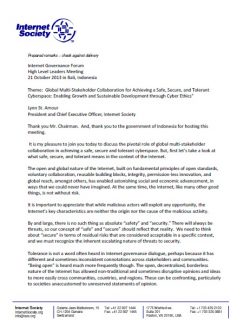Internet Governance Forum
High Level Leaders Meeting
21 October 2013 in Bali, Indonesia
By Lynn St. Amour, President and Chief Executive Officer, Internet Society
Thank you Mr. Chairman. And, thank you to the government of Indonesia for hosting this meeting.
It is my pleasure to join you today to discuss the pivotal role of global multi-‐stakeholder collaboration in achieving a safe, secure and tolerant cyberspace. But, first let’s take a look at what safe, secure, and tolerant means in the context of the Internet.
The open and global nature of the Internet, built on fundamental principles of open standards, voluntary collaboration, reusable building blocks, integrity, permission-‐less innovation, and global reach, amongst others, has enabled astonishing social and economic advancement, in ways that we could never have imagined. At the same time, the Internet, like many other good things, is not without risk.
It is important to appreciate that while malicious actors will exploit any opportunity, the Internet’s key characteristics are neither the origin nor the cause of the malicious activity.
By and large, there is no such thing as absolute “safety” and “security.” There will always be threats, so our concept of “safe” and “secure” should reflect that reality. We need to think about “secure” in terms of residual risks that are considered acceptable in a specific context, and we must recognize the inherent escalating nature of threats to security.
Tolerance is not a word often heard in Internet governance dialogue, perhaps because it has different and sometimes inconsistent connotations across stakeholders and communities. “Being open” is heard much more frequently though. The open, decentralised, borderless nature of the Internet has allowed non-‐traditional and sometimes disruptive opinions and ideas to more easily cross communities, countries, and regions. These can be confronting, particularly to societies unaccustomed to unreserved statements of opinion.
It is sometimes human nature to push away things that are different, new, or contrary to our thinking, but if, as a global community, we wish to be tolerant, we must accept that everyone may not share the same views and, importantly, that diversity of opinion and the opportunity for discussion and debate, such as that offered through the IGF, provides greater opportunity for creativity and invention. At the same time, tolerance demands that when we express our opinions, we are mindful of the impact they might have, respectful of the rights of others, and thoughtful in how they are delivered.
Openness, tolerance, and trust are all very important for effective sustainable policy development. Not all stakeholders are as well equipped to contribute their opinions and ideas, whether through lack of resources, language, or otherwise. Some may prefer more formal interactions while others are more comfortable in a less formal environment. Multistakeholder collaboration aims to bridge the differences so that everyone can contribute effectively and, thereby, offer the world better opportunities and decisions.
The highly publicized covert government sanctioned surveillance activities are alarming -‐-‐ and are a major threat to trust, which is particularly fundamental in cyberspace. The Internet must be a trusted channel for secure, reliable, private communication between users. One of the key building blocks for that trust is respect for internationally recognised data protection standards. Actions that undermine that trust, such as systematic surveillance, threaten to disrupt natural economic and social interactions that are the foundations for sustained global prosperity.
Now more than ever, it is imperative that the international community strengthens cooperation to ensure that appropriate policies are collaboratively developed and fairly implemented, and that restrictive or harmful policies are not pursued. Tough and controversial issues should be debated in the open.
In closing, the citizens of the world deserve and will demand a global and open platform for communication, built on solid foundations of security and privacy. We must work together to find solutions that give that to each and every one of us. And, we need to restore the principles and relationships of trust upon which the global Internet has been built. The IGF meeting this week will provide an excellent opportunity for all stakeholders to discuss how best to restore these principles.
Finally, returning to more traditional roles for governments and policy makers is unlikely to be adequate to restore these principles or to restore trust; particularly given this is how such pervasive surveillance flourished in the first place. To be clear, we are not saying there is no role for governments, but we are asking everyone to look to the future and move very thoughtfully, as a lot is at stake.
We need to look very carefully at the de-‐centralized, distributed nature of the Internet and it’s management and development, as it has given the world so very much, and has shown its robustness and scalability – time and time again. We should not throw that out in response to the current set of threats or desires of some.
Thank you.
